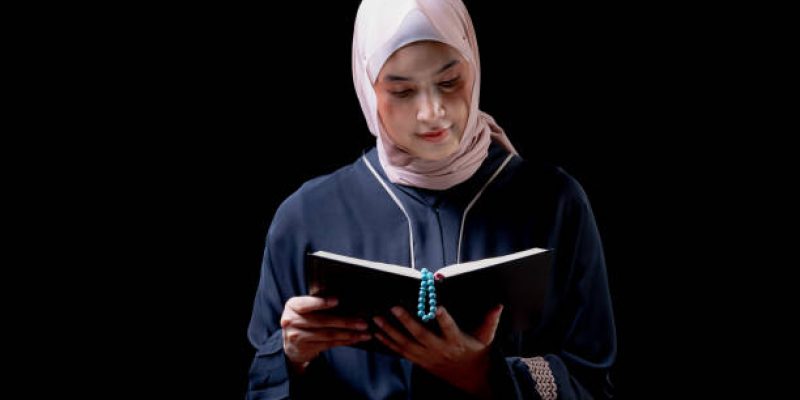The Quran – the holy book of Islam – states that men and women are created from the same soul and are meant to be equal partners. Both genders share the same religious duties and will be equally rewarded on the Day of Judgment. Besides, it’s important to distinguish between Islam and cultural traditions. Some Muslim societies may appear to oppress women, but it’s often their cultural practices. Yes, it is not the religion that restricts women’s rights! In contrast, Islam empowers women and grants them a rightful place in society, unlike any other religion or ethnicity.
Before the advent of Islam, female infanticide was a common practice among the Arabs. Islam not only abolished this cruel custom by considering it murder but also challenged the prevailing belief that the birth of a girl was less auspicious than a boy’s. Also, Islam teaches that the birth of any child is a great blessing!
Read More: What Does The Quran Say About The Nature of Life?
Read More: Respecting Parents: An Obligation According to the Quran
Women In Islam Are Always Quoted To Be Important Parts Of A Society
Islam places a significant emphasis on the status of women. She plays various roles in society, each of which is valued and respected.
- She is a mother, and it is often said that “Paradise lies under her feet.” This highlights the importance of honoring and caring for one’s mother. In a hadith, the Prophet (peace be upon him) was asked who deserved the most care, and he replied, “Your mother.” Besides, this response was repeated three times before mentioning the father, emphasizing sons’ primary responsibility towards their mothers.
- Additionally, a woman is a daughter and sister. Means? She shares the same lineage and womb as her male counterparts. The Prophet (peace be upon him) declared that women are the equal sisters of men.
- As a wife, a woman brings comfort to her husband, and he brings comfort to her. Love and mercy are expected to exist between them. The Quran describes the relationship between spouses as being like garments for each other. Do you know what it symbolizes? Closeness and protection!
Women comprise half of society and are responsible for nurturing, guiding, and educating future generations. Further, they play a vital role in instilling principles and faith into the hearts of the nation. Islam rejects any notion that women are inherently impure or evil. The Prophet (peace be upon him) explicitly stated that a believer is never impure.
In Islam, people are distinguished based on their faith, God-consciousness, and conduct rather than gender. Moreover, the Quran emphasizes that the most honourable among people is the most God-fearing one! Plus, there is no Quranic or Sunnah support for false claims that put all of the blame on Eve for eating from the forbidden tree. Both Adam and Eve received the divine command and were equally responsible for their actions. Well, they repented together for their mistake, too.
Education For Women As Guided In Qur’an And Hadith
Islam doesn’t forbid women from pursuing professional work. In fact, in an ideal Islamic society, women must take on certain roles. This means they should receive the education and training required for important professions. These can be anything that is for the good of society. In this holy religion, learning isn’t just a right but also a duty and responsibility for everyone. Prophet Muhammad emphasized this when he said, “Seeking knowledge is mandatory for both Muslim males and females” (Ibn Majah). This teaching aligns with those in the Quran, which highlights the elevated status of those who possess knowledge, men or women.
Moreover, Islamic law doesn’t restrict women to specific areas of education. They have the freedom to choose their fields of study. However, certain subjects are particularly recommended for females to equip themselves for their intended roles, including medicine, nursing, home management, health care, and child psychology. Additionally, fields like arts, humanities, and sciences are open to both genders as long as they are beneficial. Also, there are only a few prohibited areas of study in Islam, such as sorcery and magic.
Women’s Right to Vote, Be Elected, and Serve in Public & Governmental Positions
There is not a shred of evidence in Sharia that prohibits it and looks down on women for doing so. Allah’s words in the Quran state that male and female believers are responsible for each other and should enjoin what is good and forbid what is wicked. This implies that ladies have the right to participate in elections and vote for their representatives. In some Muslim countries, they have the absolute right to vote, which is seen as a demonstration of their commitment to democracy. Besides, Muslim women should not shy away from this opportunity, as their reluctance to vote can weaken the position of Islamic candidates.
Regarding women’s membership in representative councils and similar bodies, there is also no explicit banning. The arguments against women’s participation often revolve around the assumption that women lack knowledge of public affairs and can be easily misled. Moreover, this argument is flawed because ignorance or knowledge gaps are not gender-specific.
Some women are knowledgeable and experienced in public affairs, just as some men may lack such expertise. The focus should be on the fundamental right to participate, not on the specific qualifications required of every candidate, regardless of gender.
Some argue that women’s physical conditions, such as menstruation, childbirth, and labour, may hinder their performance in a council. On a lighter note, men may also face health issues that affect their performance. Additionally, membership in representative councils typically has age requirements, which means that by the time a woman reaches the eligible age range (usually around 40), she will likely have completed her childbearing responsibilities and gained maturity, stability, and experience.
Moreover, immodesty and concerns about the intermingling of the sexes are often raised as counter-arguments. However, advocating for modesty and adhering to Islamic dress codes is a fundamental requirement for all. Special provisions, such as separate election centers for women, already exist in most Islamic countries to guarantee unpretentiousness and prevent intermingling. Also, allocating designated areas for females within representative councils can further address these concerns.
The Utmost Respect For Women
During his Farewell Pilgrimage address, the Messenger of Allah (peace be upon him) emphasized the importance of treating women with respect and fulfilling one’s obligations to Allah regarding them, saying, “Fulfill your duty to Allah concerning women and treat them kindly.”
Regarding Gazing at Women
Imam al-Sadiq (peace be upon him) was once asked whether it is permissible for a man to look at the face of a woman he intends to marry. He responded, “Yes, there’s no objection for a man to look at a woman he plans to marry, including her face, and from behind.”
Punishment for Inappropriately Chasing Women
Imam Ja’far al-Sadiq narrated an incident involving a young man from the Ansar who encountered a veiled woman in Madina. As she approached, he gazed at her. Now, as she passed by, he continued to stare at her until he entered an alley. He continued to look, and suddenly, a protruding bone on a wall injured his face as the woman vanished from sight.
Startled, he noticed blood flowing from his wounds and decided to report the incident to the Messenger of Allah (peace be upon him). When the Prophet learned of the details, the Angel Jibril descended with the verse: ‘Say to the believing men that they should lower their gaze and guard their private parts. That is purer for them. Truly Allah is Cognizant of what they do.’ (Holy Qur’an, 24:30)
Equality
The Holy Quran underscores gender equality in various verses.
- It states, “…and women have rights similar to those against them in a just manner,…” (Holy Qur’an, 2:228).
- Furthermore, it proclaims, “O mankind, surely We have created you from a male and a female, and made you nations and tribes, that you may know each other. Surely, the noblest of you with Allah is the most righteous. Surely Allah Knowing, Aware.”(Holy Qur’an, 49:13).
- Additionally, the Quran also highlights that both will be rewarded for their good deeds. “And whoever does righteous deeds, whether male or female, and he/she is a believer – they will enter the Garden, and not the least injustice will be done to them.” (Holy Qur’an, 4:124).
- Furthermore, Allah promises that no effort expended in His cause, whether by a man or a woman, will go to waste: “…I will not suffer the work of any worker among you to be lost whether male or female, the one of you being from the other…”(Holy Qur’an, 3:195).
Read More: How do I start learning Quran?
Read More: At what age do I teach my child the Quran?
Takeaway
Women have been and always will be the foundations of any society globally. Also, Islam makes no exceptions in highlighting just how important of a role they play. While there are people who like to follow twisted versions of our religion, the teachings of the Qur’an and Sunnah are enough to negate everything that they do. It is our duty to keep on offering knowledge and always be in pursuit of more to learn, especially when it comes to Islam. Moreover, the Quraan Teacher is doing just that! We’re doing our duty here by teaching and waiting for you to sign up for our online Quran classes.

